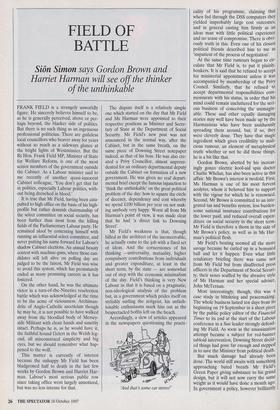FIELD OF BATTLE
Sion Simon says Gordon Brown and Harriet Harman will see off the thinker of the unthinkable
FRANK FIELD is a strangely unworldly figure. He sincerely believes himself to be, as he is generally perceived, above or per- haps beyond, the blacker side of politics. But there is no such thing as an ingenuous professional politician. There are guileless local councillors who beaver away for years without so much as a sideways glance at the bright lights of Westminster. But the Rt Hon. Frank Field MP, Minister of State for Welfare Reform, is one of the most senior members of the government outside the Cabinet. As a Labour minister said to me recently of another quasi-innocent Cabinet colleague, 'You don't get that far in politics, especially Labour politics, with- out being drenched in blood.'
It is true that Mr Field, having been cata- pulted to high office on the basis of his high- profile but rather donnish chairmanship of the select committee on social security, has been further than most from the killing fields of the Parliamentary Labour party. He remained aloof by contenting himself with running an influential select committee, and never putting his name forward for Labour's shadow Cabinet elections. An annual beauty contest with machine-guns, where those can- didates still left alive on polling day are judged to be the fairest, Mr Field was wise to avoid this system, which has prematurely ended as many promising careers as it has fostered.
On the other hand, he was the ultimate victor in a turn-of-the-Nineties reselection battle which was acknowledged at the time to be the acme of viciousness. Archiman- drite of Anglo-Catholic asceticism though he may be, it is not possible to have walked away from the bloodied body of Mersey- side Militant with clean hands and sanctity intact. Perhaps he is, as he would have it, the faithful hound Gelert in the Welsh leg- end, all misconstrued simplicity and big eyes, but we should remember what hap- pened to the wolf.
This matter is currently of interest because the unhappy Mr Field has been bludgeoned half to death in the last few weeks by Gordon Brown and Harriet Har- man. Labour's most serious public row since taking office went largely unnoticed, but was no less intense for that. The dispute itself is a relatively simple one which started on the day that Mr Field and Ms Harman were appointed to their respective positions as Minister and Secre- tary of State at the Department of Social Security. Mr Field's new post was not announced in the normal way, after the Cabinet, but in the same breath, on the same piece of Downing Street notepaper indeed, as that of his boss. He was also cre- ated a Privy Councillor, almost unprece- dented for an ordinary departmental deputy outside the Cabinet on formation of a new government. He was given no real' depart- mental brief except the famous injunction to 'think the unthinkable' on the great political problem of the day: how to square the circle of decency, dependency and cost whereby we spend E100 billion per year on not mak- ing anybody very happy. Worst all from Ms Harman's point of view, it was made clear that he had 'a direct link to Downing Street'.
Mr Field's weakness is that, though billed as the architect of the inconceivable, he actually came to the job with a fixed set of ideas. And the cornerstones of his thinking —universality, mutuality, higher compulsory contributions from individuals and greater expenditure, at least in the short term, by the state — are somewhat out of step with the economic minimalism of the day. Field's thinking is very New Labour in that it is based on a pragmatic, non-ideological analysis of the problem but, in a government which prides itself on stylishly surfing the zeitgeist, his unfash- ionable enthusiasms mark him out as the bespectacled boffin left on the beach.
Accordingly, a slew of articles appeared in the newspapers questioning the practi- 'And that's some car stereo!' cality of his programme, claiming that when fed through the DSS computers they yielded improbably large cost outcomes, and in general casting him firmly as an ideas man with little political experience and no sense of compromise. There is obvi- ously truth in this. Even one of his closest political friends described him to me as 'impatient of the process of negotiation'.
At the same time rumours began to cir- culate that Mr Field is, to put it plainly, bonkers. It is said that he refused to accept his ministerial appointment unless it was accompanied by membership of the Privy Council. Similarly, that he refused to accept departmental responsibilities com- mensurate with his status, in order that his mind could remain uncluttered for the seri- ous business of conceiving the unimagin- able. These and other equally damaging stories may well have been made up by the Hannanistas who have been assiduously spreading them around, but, if so, they were cleverly done. They have that magic ingredient which gives credibility to mali- cious rumour, an element of metaphysical truth: whether or not he did those things, he is a bit like that.
Gordon Brown, abetted by his increas- ingly gonzo electric kool-aid spin doctor Charlie Whelan, has also been active in this affair. Mr Brown's interest is twofold. First, Ms Harman is one of his most fervent acolytes, whom it behoved him to support with the vigour for which he is renowned. Second, Mr Brown is committed to an inte- grated tax and benefits system, less burden- some national insurance contributions for the lower paid, and reduced overall expen- diture on social security in the short term. Mr Field is therefore a thorn in the side of Mr Brown's policy, as well as in Ms Har- man's political flesh.
Mr Field's beating seemed all the more savage because he curled up in a bemused ball and let it happen. Even what little retaliatory briefing there was came not from Mr Field but from disaffected press officers in the Department of Social Securi- ty, their noses scuffed by the abrasive style of Ms Harman and her special adviser, John McTernan.
Most interestingly, though, this was a case study in blitzkrieg and peacemaking. The whole business lasted ten days from its beginning on 19 September in a short piece by the public policy editor of the Financial Times to its end at the start of the Labour conference in a Sun leader strongly defend- ing Mr Field. As soon as the assassination attempt became a subject for red-banner tabloid intervention, Downing Street decid- ed things had gone far enough and stepped in to save the Minister from political death. But much damage had already been done. The world still awaits with something approaching bated breath Mr Field's Green Paper giving substance to his grand design, but it will not now carry the same weight as it would have done a month ago. In government a policy, however brilliantly
crafted, is worthless without a sponsor to own it and drive it through to fruition. This Process is the very engine-room of politics, not to be undertaken by men frightened of dirtying their collars.



























































































 Previous page
Previous page